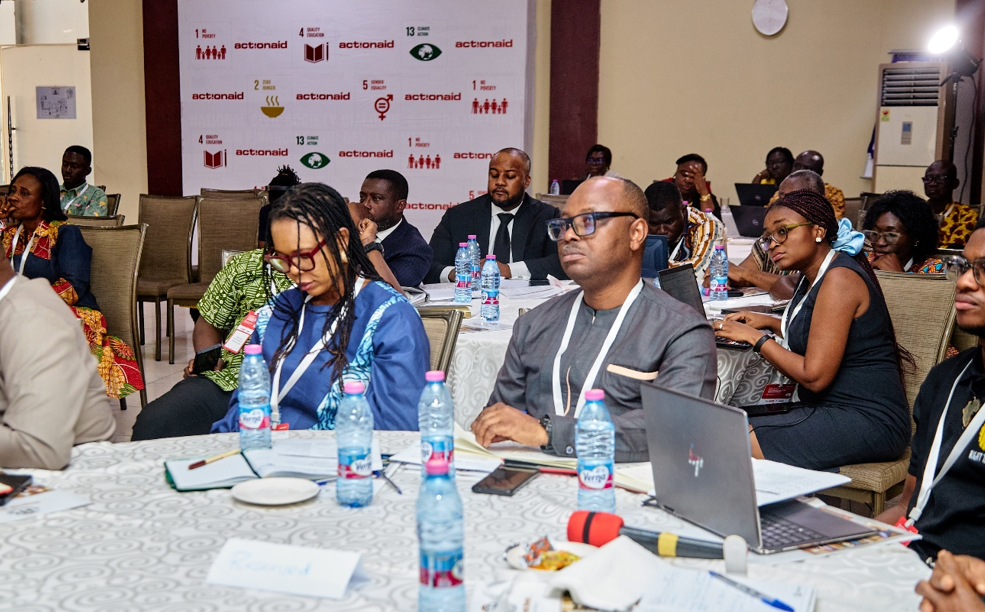Ghana is at a critical climate crossroads—and unless bold policy and financing decisions are taken now, the cost of inaction could overwhelm the country’s economy, environment, and future generations.
This was the urgent call at the National Civil Society–Government Dialogue on Development Financing and Food System Reform, hosted by ActionAid Ghana on Friday, June 20 at the Tomreik Hotel in Accra.
The event brought together high-level policymakers, climate and energy experts, civil society leaders, and development partners to confront the intersecting crises of climate change, unsustainable debt, and an energy system in need of transformation.
Held under the theme: “Reviewing Development Financing for People and Planet,” the dialogue aimed to chart bold pathways for Ghana’s climate-resilient future—one anchored in justice, green energy, and people-centred policy.
Climate Impacts Rising; Green Solutions Lagging
Ghana’s vulnerability to climate change is deepening by the year. From extreme rainfall and deadly floods to unpredictable growing seasons and infrastructure collapse, the climate emergency is no longer a future threat—it is a lived reality.
According to Denis Gyeyir of the Natural Resource Governance Institute (NRGI), climate-related impacts are already costing Ghana:
45,000 people displaced by flooding annually
$3.9 billion in projected transport sector losses
Up to 40% income loss for poor households by 2050
A climate financing gap of over $15 billion by 2030
“These numbers are not abstract. They reflect broken lives, rising poverty, and economic collapse if we do not act,” Gyeyir said.
Green Energy Must Be the Foundation of Ghana’s Recovery
Speaking at the dialogue, Dr. Robert Bright Mawuko Sogbadji, Deputy Director for Power (Alternative Energy) at the Ministry of Energy, outlined the urgent need for Ghana to shift from fossil fuel dependency to a just and inclusive green energy future.
“Ghana must lead its own green transition—not as a burden but as an opportunity to create jobs, expand energy access, and strengthen climate resilience,” Dr. Sogbadji said.
Key government interventions shared included:
Development of green hydrogen in collaboration with ECOWAS
Elimination of import taxes on electric vehicles to promote green public transport
Construction of 33 new solar mini-grids, expanding on the 8 currently in operation
Creation of a Renewable Energy and Green Transition Fund
Establishment of a Renewable Energy Authority and elevation of the Renewable Energy Unit to a full Directorate
Dr. Sogbadji acknowledged challenges—including limited battery storage technology and resistance from global fossil fuel markets—but emphasized the need for homegrown leadership in green energy innovation.
Green Growth Can’t Wait: Civil Society Demands Climate Financing Reform
John Nkaw, Country Director of ActionAid Ghana, challenged government and civil society actors alike to urgently rethink how Ghana mobilizes and uses resources in a warming world.
“Development financing must work for people and the planet—not just creditors and corporations. Our current model—fuelled by debt, donor dependency, and extractive investments—is failing us,” Nkaw asserted.
Nkaw called for:
Scaling up domestic resource mobilisation for climate investments
Ending illicit financial flows and curbing corporate tax avoidance
Prioritising gender-just and community-led energy solutions
Creating partnerships that are flexible, accountable, and long-term
Energy Justice is Climate Justice
The dialogue underscored a critical reality: Ghana cannot address its food security, energy access, or climate resilience goals without confronting structural inequalities in global and domestic finance.
Wilberforce Laate of CIKOD advocated agroecology as a key pillar of green development. “We cannot talk about green energy without talking about how we grow our food. Agroecology is not only sustainable—it is debt-free, localised, and climate-resilient,” he said.
A Call to Action: From Policy to People Power
Participants across sectors committed to advancing a unified green transition agenda focused on:
Investing in clean energy infrastructure and public transport
Creating green jobs for youth, women, and rural communities
Integrating green budgeting across ministries and local authorities
Removing policy bottlenecks that limit access to global climate finance
Ensuring that all green energy interventions are pro-poor, pro-people, and pro-planet
The message was clear: Ghana’s climate future must be people-powered.
“We are not just talking about energy or environment. We are talking about sovereignty, survival, and social justice,” said one grassroots activist during the plenary.
As climate change accelerates and global financial systems remain skewed against developing countries, ActionAid Ghana’s dialogue serves as a timely wake-up call—and a blueprint for bold action.
It is now up to policymakers, civil society, and communities to ensure that the transition to green energy is not only fast—but fair. The cost of delay is too high. The time to act is now.
DISCLAIMER: The Views, Comments, Opinions, Contributions and Statements made by Readers and Contributors on this platform do not necessarily represent the views or policy of Multimedia Group Limited.
DISCLAIMER: The Views, Comments, Opinions, Contributions and Statements made by Readers and Contributors on this platform do not necessarily represent the views or policy of Multimedia Group Limited.


